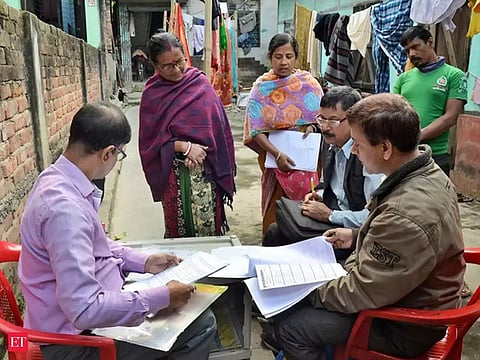Counting castes, calculating votes: Inside India’s high-stakes gamble
As Bihar polls loom, government walks tightrope between ideology and electoral arithmetic

The Indian government recently announced a caste census — a complete U-turn on a fundamental issue that has bedevilled India for centuries. The government, led by Narendra Modi, made the announcement at a time when an angry nation was awaiting action to punish the perpetrators of the Pahalgam terror attack, in which 26 men died barely 10 days ago.
Was the announcement — which the opposition, particularly Congress leader Rahul Gandhi, Samajwadi Party chief Akhilesh Yadav, and Tejashwi Yadav of the Rashtriya Janata Dal (RJD), claimed as their victory because they had long demanded a caste census — timed to benefit ally Nitish Kumar just ahead of the forthcoming Bihar elections? Or was it an attempt to shift focus from the bellicose narrative in which the Modi government and its cheerleaders had entangled themselves — a narrative so muddled that even serious analysts struggled to decode it?
Reading the tea leaves — repeated, televised meetings of the Cabinet Committee on Security (CCS) with Union ministers Amit Shah, Rajnath Singh, the three service chiefs, and National Security Adviser Ajit Doval, as well as a meeting with Mohan Bhagwat, the paterfamilias of the Sangh Parivar and chief of the Rashtriya Swayamsevak Sangh (RSS) — the buzz was that “kinetic action” was imminent. Instead, India was served the caste census. The BJP’s infamous social media ecosystem had a tough time, quite literally, eating its words and hailing something it had repeatedly mocked Rahul Gandhi for as a “Modi masterstroke” — even as they are accustomed to mental contortions.
Forget the BJP’s social media yodhas (warriors) — even heavyweight ministers like Nitin Gadkari, a superstar of the Modi cabinet and a darling of the RSS, had once said on camera that he would beat anyone who demanded a caste census with his shoes. One wonders what he said at the Cabinet meeting. This was the background to the contentious announcement.
Takeaways from caste census decision
The foreground was still dominated by threats from Shah toward those responsible for the tragic Pahalgam attack. So, what is the takeaway from all these signs for my astute readers of SWAT analysis?
Despite reservations for lower castes being capped at 50 per cent, caste discrimination hasn’t gone away. We still witness daily acts of violence and exclusion — from Dalits being barred from riding horses during their weddings to the inhumane, manual cleaning of gutters, a job that should have been mechanised decades ago but continues to fall upon the poorest among Dalits.
Privilege — especially generational privilege — is so deeply ingrained in India’s upper castes that the equality promised by the Constitution is often perceived by them as oppression. Caste divides the Hindu religion and society into stifling confinements, including food practices and social interaction.
The RSS, which aspires for a united, homogeneous “Hindu Samaj” voting collectively for the BJP, is wholly opposed to the caste census, as it challenges entrenched upper-caste Hindu interests. The BJP, however, as a political party, must craft policies that ensure the broadest voter appeal. This is the dilemma before Modi and Shah, who are more aware than any political commentator that the BJP’s most loyal vote bank consists of upper-caste men and women — steadfast Modi supporters for three terms — who see the caste census as a betrayal of their interests.
No details yet
The announcement has been made, but no details have been shared yet regarding a timeframe or budget for the proposed caste census. Is it merely a trial balloon to deflate an angry, confrontational narrative — conveniently timed ahead of the Bihar elections, allowing Nitish Kumar to reap electoral dividends?
Already, ally and Bihar minister in the Modi government, Chirag Paswan, is claiming credit for the census and demanding reservations in the private sector as the next logical step — which he claims the Modi government is determined to take.
Rahul Gandhi, the most vocal advocate for the caste census, is ironically the least politically positioned to benefit, as the Congress has little stake in the upcoming elections and lacks organisational strength in states like Uttar Pradesh, where such a move could have impact. Akhilesh Yadav’s Samajwadi Party, anchored in a Yadav vote bank, may gain some traction with his “PDA” formula — Pasmanda, Dalit, and Yadav. Similarly, the Yadav clan in Bihar, with patriarch Lalu Prasad Yadav already jubilant, believes this could compel the Modi government to fulfill the INDIA alliance’s agenda.
Eyes on Bihar polls
One should remain circumspect about the current political push-and-pull the BJP faces. The results of the Bihar elections will be a crucial verdict on whether a caste census — and a formal documentation of the numbers and percentages of India’s diverse castes — becomes official policy and the foundation for future reservation schemes.
The Mandal Commission report was ferociously resisted by the BJP, as it was seen as a check on its rise through Ram temple politics. Eventually, Mandir versus Kamandal politics was folded into the BJP’s ideology and governance seamlessly. Something similar could happen with the caste census, especially as the BJP’s leadership now better reflects the composition of real India.
The RSS is reluctantly on board, yet remains locked in a behind-the-scenes tussle over who should replace J.P. Nadda as BJP president. The delay, reportedly, is due to the RSS insisting on a strong leader — not merely a foil for the supreme BJP leader, Modi. Parsing those tea leaves will be instructive, once a decision is made on who truly calls the shots in the Hindutva parivar.
Punishment for the Pahalgam terror attack is certain, but India must follow its own timelines. Ultimately, the best revenge against our enemies is a strong, united, prosperous, inclusive, and fair India — where all citizens, including minorities, are treated with scrupulous justice. That is what truly sets us apart.




